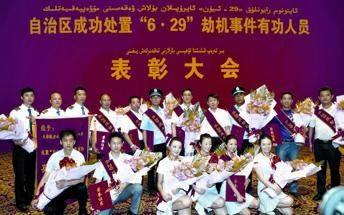A Crashed Attack
By Yin Pumin

All 16 airports in northwest Chinas Xinjiang Uygur Autonomous Region have heightened security following a foiled hijacking, the airport operator and airlines in the region announced on July 5.
Passengers need to have all their take-on bottles and most of their baggage opened for inspection, according to Xinjiang Airport Group Co. Ltd., the regional airport operator.
In particular, the disabled should present hospital-issued disability certificates if they want to bring crutches or other mobility aids on board.
Passengers at Kashgar Airport in south Xinjiang near Hotan must check their crutches and wheelchairs in as baggage, according to the airport.
On June 29, six passengers, all male, tried to hijack Tianjin Airlines flight GS7554, with 101 people on board, just 10 minutes after it took off from the Hotan Airport en route to Urumqi, the regional capital.
According to police and witness, the hijackers, all ethnically Uygur, dismantled a crutch into aluminum pipes to use as weapons. They tried to storm the cockpit but were subdued by flight security guards and passengers. During the fight, two police officers were injured and two cabin crew and six passengers suffered minor cuts and bruises.
In the first official comments on the incident at a press conference on July 2, Foreign Ministry spokesman Liu Weimin said that hijacking an airplane is a serious and violent terrorist attack.“The entire world should condemn the crime of hijacking civilian aircraft,” he said.
Li Wei, Director of the Institute of Security and Strategic Studies at the Beijingbased China Institutes of Contemporary International Relations, said what happened in Xinjiang was a terrorist attack, judging by the nature of the hijack.
“The hijackers adopted violent measures to threaten the lives of civilians and their intentions are also suspicious since the incident happened just before July 5, the third anniversary of the riots in Xinjiang,” Li said. “The successful frustration of this terrorist plot proves that airport security is very important and that its also vital for the crew members and passengers to act quickly.”
On July 5, 2009, Xinjiang saw the worst outbreak of violence in decades when riots incited by overseas groups broke out in Urumqi. Nearly 200 people were killed and about 1,700 injured.
Xinjiang has been on the countrys forefront against terrorism. Violent attacks have erupted across the vast region over the past two decades. Experts say many are linked to a surge of religious extremism in the region.
Zhang Jiadong, a professor with Shanghaibased Fudan University, said that the antiterrorism situation in Xinjiang is becoming more complicated as a result of Washingtons shift away from the global war on terror.
“The United States relaxed its focus on the so-called East Turkistan Islamic Movement, and sometimes it even turns a blind eye to the movement, leaving the terrorists opportunities to incite violence in Xinjiang,” Zhang said.
In order to better fight against terrorism, the authorities have put great emphasis on building antiterrorism forces in Xinjiang and the forces have played an important role, said Li.
The Urumqi-based antiterrorism forces were formed in the 1990s when regional separatists and religious extremists engaged in bombings, assassinations and arson.
Li said that compared with the 1990s, there are more suicide terrorist attacks now. “Unlike remotely detonated bombs or poisoning, terrorists now attack in broad daylight and put their own lives on the line,” said Li. “Therefore, the situation is more dangerous and more difficult, requiring special forces to enhance their skills and capabilities, such as rapid response and intelligence gathering.”
On July 7-8, two antiterrorism exercises codenamed Bofeng 2012 were held in suburban Urumqi and Dabancheng District on the outskirts of the city.
Special unit police officers demonstrated their shooting and combat skills during the exercises. A simulated terrorist hijacking of a bus tested their skills. The police officers also staged a drill on how to handle mass incidents.
The two exercises came after another counterterrorism drill in Urumqi on July 4. When overseeing the drill, Zhang Chunxian, Party chief of CPC Xinjiang Autonomous Regional Committee, asked soldiers to remain vigilant against hostility and to strike the “three forces” of separatists, extremists and terrorists with “iron fists.”
“We should leave terrorists no place to hide,” said Zhang, who described Xinjiangs overall situation as “stable but facing severe challenges.”
In order to express its gratitude, Hainan Airlines (HNA), who owns Tianjin Airlines, announced on July 9 that it will grant the title of “HNA honorary passenger” to 22 passengers who helped subdue the hijackers. They will receive free lifetime airfare from HNA.

